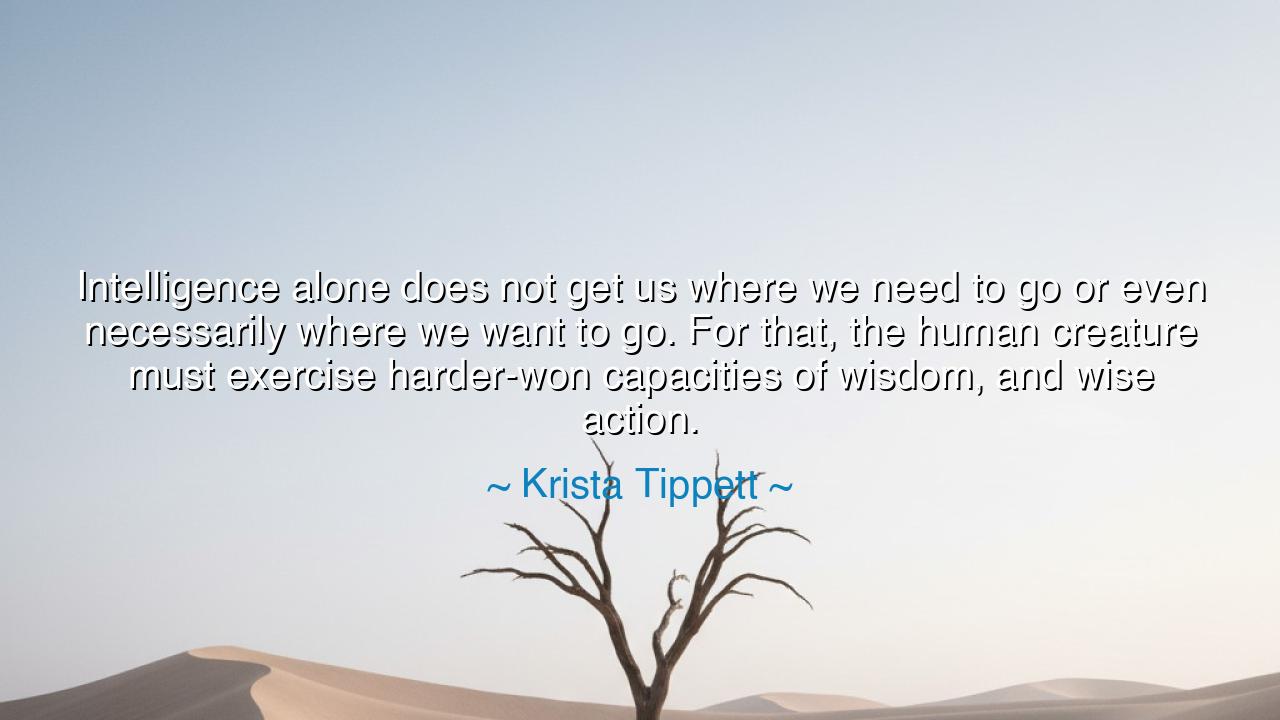
Intelligence alone does not get us where we need to go or even
Intelligence alone does not get us where we need to go or even necessarily where we want to go. For that, the human creature must exercise harder-won capacities of wisdom, and wise action.






Hear, children of thought and conscience, and ponder the words of Krista Tippett, who spoke with quiet depth: “Intelligence alone does not get us where we need to go or even necessarily where we want to go. For that, the human creature must exercise harder-won capacities of wisdom, and wise action.” Within this teaching lies a timeless truth — that knowledge without discernment is a sword without a hand to wield it rightly, and brilliance without compassion can lead not to progress, but to peril. Intelligence illuminates the path, yet only wisdom determines whether the path leads toward the good.
Tippett, a seeker and thinker known for exploring the spiritual dimensions of modern life, reminds us that intellect, though dazzling, is not sufficient for wholeness. The mind may construct, invent, and analyze — but it cannot by itself determine meaning. The wise ancients distinguished between the clever and the wise. To be clever is to manipulate the world; to be wise is to understand one’s place within it. Intelligence gathers the facts of existence, but wisdom perceives their purpose.
History itself bears witness to this divide. The twentieth century was an age of astonishing genius — of scientific leaps that unlocked the atom and reached the stars. Yet, from that same intelligence came weapons of terror and destruction. When Oppenheimer, father of the atomic bomb, beheld the fruit of his intellect, he quoted the Bhagavad Gita: “Now I am become Death, the destroyer of worlds.” He had achieved greatness of mind, but it was wisdom he lacked — the moral compass to guide that power toward peace. Thus, Tippett’s words echo through the ages: intelligence builds the tool, but wisdom decides how to use it.
The ancients knew this balance well. In Athens, the philosopher Socrates declared himself the wisest of men only because he knew how little he truly knew. For him, wisdom was humility — the acknowledgment that understanding is not mastery, but harmony with truth. So too, Tippett calls upon the modern mind to temper its pride with reverence. For every human breakthrough demands a moral counterpart — a deepening of empathy, compassion, and restraint. Without these, intellect becomes arrogance, and progress turns upon itself.
To cultivate wisdom, one must train not only the mind, but the heart. It is forged through experience, reflection, and suffering. Wisdom asks: What is right? What serves life? It is slow, patient, and grounded, where intelligence is quick and restless. In every age, civilizations rise on intellect and endure through wisdom. Consider Nelson Mandela, who, after twenty-seven years of imprisonment, emerged not with vengeance, but forgiveness. His wisdom transformed bitterness into reconciliation — a triumph of moral understanding over mere strategy.
Krista Tippett’s insight is therefore both prophetic and practical. She reminds us that to build a just and flourishing world, we must move beyond the >“harder-won capacities” she speaks of require discipline: humility, empathy, and courage, the virtues that turn thought into transformation.
The lesson, then, is this: seek knowledge, but do not worship it. Let every act of learning be tempered by love, and every act of reason by conscience. Be not only intelligent, but wise; not only informed, but humane. For in the union of intellect and wisdom lies the true potential of humanity — the power to create not only what is possible, but what is just, beautiful, and enduring.
Thus, let Tippett’s words ring within you as a compass for all your days: intelligence may show you how to build, but wisdom shows you what to build for. Nurture both — the mind that seeks truth, and the spirit that honors it — and you will not merely advance in knowledge, but ascend in understanding. For it is not intellect that saves the world, but the wise heart that knows how to use it.






AAdministratorAdministrator
Welcome, honored guests. Please leave a comment, we will respond soon